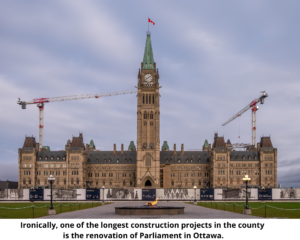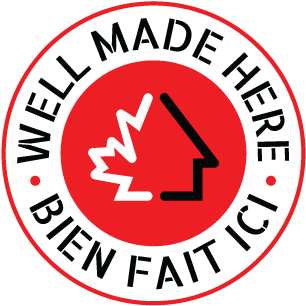Manufacturers of residential products want more protection from central government
“It is not in the DNA of private business leaders to call for government intervention. But in the case of the battle against unfair competition, the request is made with conviction, even with a certain amount of noticeable concern”.

The statement made by Richard Darveau, President and CEO of Well Made Here (WMH), refers to a survey conducted by the organization in July, to which 65 senior executives from residential product manufacturers across the country responded. All of them are members of the WMH program and share a common belief regarding the need to manufacture locally rather than relying on foreign suppliers.
As we know, there are imported products on the Canadian market that do not necessarily comply with building codes or certain national standards, in particular the standards set by the Canadian Standards Association (CSA). With this in mind, 49 of the 65 respondents to the survey are calling on the central government to provide better protection for manufacturers established in Canada who choose to comply with the quality standards in effect here. Only a dozen respondents felt that the current monitoring activities were sufficient. Finally, four respondents believe that the government should reduce its control and open up the market more freely.
|
75 % of manufacturers who comply with Canadian standards |
Among the comments received, one respondent suggested that non-compliant labeling should be denounced, in fact, that any product whose characteristics do not meet Canadian standards should be clearly identified.
One respondent denounced the bureaucracy; the effort seems considerable and discouraging when a company that believes it has been wronged wants to take action to protect its rights…
The ecological issue and that of working conditions were addressed in a similar spirit, with 50 of the 65 respondents calling on the Canadian government to protect, and even encourage, Canadian manufacturers in order to better deal with imported products, many of which do not comply with Canadian environmental standards or offer decent conditions to their workers.
|
77% of manufacturers would like the government to give greater protection |
Among the suggestions put forward was the idea of imposing a carbon footprint on imported products.
A minority of five respondents would prefer government control over these two aspects to be reduced in order to free up trade even further. Ten others felt that current government controls were sufficient.
One manufacturer extrapolated that high standards could mean higher production costs and higher selling prices. This poses the question as to whether retailers and their banners would agree to stand in solidarity with manufacturers to ensure that quality and durability ultimately reign…
The most extreme idea when it comes to products that do not meet our national quality, environmental or labour standards is to penalize the buyer as well, i.e. the retailer, the distributor, or the buying group: if all were jointly responsible, they would no doubt think twice before ordering a product that is beneath our national standards. This approach is reminiscent of the “polluter pays” approach.
Often, Canadian elected representatives fail to act because free trade agreements and the general ideology of open markets would run counter to the promotion of the purchase of Canadian materials by local consumers and businesses. Yet less than a third (31%) of respondents to our survey share this view. The vast majority (69%) consider that the government has the latitude to act, as demonstrated by the fact that the United States makes a number of positive discrimination measures in favour of domestic production when it comes to supporting the sale of domestic products rather than that of exports.
|
Only 4 out of 65 manufacturers are convinced that the Canadian government |
The survey suggested ten courses of action that WMH could propose to the Government of Canada. For cultural reasons, no doubt, the 42 French-speaking respondents and the 23 English-speaking respondents prioritized different notions.
The following five generated the most interest from the French-speaking participants in the survey:
- Require, as in the United States with “Buy America”, that funding for public construction projects be subject to minimum content thresholds for products manufactured in Canada (76%)
- Adopt a law establishing economic and ecological criteria aimed at prioritizing the purchase of construction materials made in Canada for public infrastructure projects (71.5%)
- Requiring that public procurement worth less than $250,000 be reserved for small Canadian businesses if at least two of them can meet the tender criteria (64%)
- Introduce a tax credit applicable to the purchase of “Well Made Here” accredited products during renovation and construction projects by Canadians (62%).
- Adopt a “Buy Canadian Act” copied and pasted from the U.S. measure whereby all goods purchased by federal government organizations and valued at more than $10,000 would have to be manufactured in Canada for at least 51% of the cost of their components (57%).
On the English side, the following five courses of action seem to be the most promising:
- Pass legislation establishing economic and ecological criteria to prioritize the purchase of Canadian-made construction materials for public infrastructure projects (74%)
- Increase resources to better control the entry into the country of products that meet our construction standards or any other public health or safety standards (61%)
- Introduce the equivalent of the “Made in America” measure, whereby manufacturers are offered incentives to relocate the manufacture of products or components currently outsourced overseas (61%)
- Requiring, as in the United States with the “Buy America” initiative, that funding for public construction projects be subject to minimum content thresholds for products manufactured in Canada (57%)
- Introduce a tax credit applicable to the purchase of “Made in Canada” accredited products during renovation and construction projects by Canadians (48%).
Next steps
A letter from WMH’s President and CEO, backed by the support of several of the heads of the respondent companies, is being drafted and will be sent to Justin Trudeau, Prime Minister of Canada.
Richard Darveau will then be making numerous representations to government authorities and the media to defend entrepreneurs who believe in the importance of protecting and developing our manufacturing fabric to better deal with social, political, and climate crises, but also for the wealth that products bring to our communities and our citizens.

The CEO has been invited to present his views at a symposium on the future of competition policy in Canada, to be held in Ottawa in early 2024.
